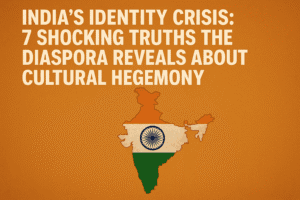India’s Identity Crisis: 7 Shocking Truths the Diaspora Reveals About Cultural Hegemony
Zohran Mamdani’s New York mayoral victory exposes a critical tension in India’s identity discourse: **who is considered “Indian” beyond legal citizenship?** The contrasting celebration of Hindu diaspora figures versus the erasure or generic labeling of Muslim ones reveals deeper historical roots. India’s founding paradox—a legally secular state built alongside a culturally Hindu national imagery (like Bharat Mata)—created fertile ground for today’s exclusion.
This manifests domestically as Muslims often being seen as Indians only by legal right, their cultural belonging conditional on majority validation. Historical precedents (Partition repatriations) and modern policies (CAA, arbitrary deportations) show how cultural-religious notions dangerously override constitutional equality. Mamdani’s unapologetic identity disrupts rigid definitions, proving identities can evolve toward inclusivity when the excluded lead. Ultimately, his story forces India to confront whether it can transcend Hindu cultural hegemony to embrace genuine pluralism where Muslim belonging is intrinsic, not earned.

India’s Identity Crisis: 7 Shocking Truths the Diaspora Reveals About Cultural Hegemony
Zohran Kwame Mamdani’s victory in the New York City Democratic mayoral primary wasn’t just an American political story. For observers of India, it ignited a revealing, and often uncomfortable, conversation: Who gets to be considered “Indian,” and who holds the power to define that identity once legal citizenship is stripped away?
The contrasting Indian reactions to figures in the global diaspora are stark. Hindu-origin individuals like Rishi Sunak, Sundar Pichai, or Usha Vance are celebrated as “India’s own,” their heritage a point of national pride. Yet, Indian-origin Muslims like Fareed Zakaria, Mehdi Hasan, or Hasan Minhaj are often relegated to the broader, less specific category of “South Asian.” Mamdani, the son of the acclaimed Padma Bhushan-winning Hindu Indian filmmaker Mira Nair, yet an outspoken critic of Modi and Hindutva policies, defies easy categorization within this framework, forcing a deeper examination.
This isn’t merely a Modi-era phenomenon, but the acceleration of a historical contradiction rooted in India’s founding secular ideal.
The Paradox of Secular Foundations:
- While the Indian Constitution enshrined secular principles like religious neutrality and equality, a parallel cultural nationalism emerged.
- Visualized powerfully through Bharat Mata imagery by the 1930s and 40s, the nation was increasingly depicted as essentially Hindu – a goddess figure, often wielding a trishul, superimposed on the map.
- Crucially, many secular Congress leaders of the time saw no conflict; the legal state could be secular while the cultural nation remained distinctly Hindu (and usually upper-caste).
The Domestic Fallout: Erasure and Conditional Belonging
This historical foundation enabled the gradual sidelining of Muslim culture from the mainstream “Indian” narrative, a process turbocharged in recent decades. The consequences are profound and domestic:
- The “Legal vs. Cultural” Indian: Hindus are seen as Indian both legally and culturally. Muslims, however, are often treated as Indian only as a matter of legal right. Their cultural space within the national identity is frequently defined for them by the Hindu majority.
- The Liberal Trap: For many liberal Hindus, Muslims serve primarily as proof of India’s secularism – provided they downplay visible markers of faith and constantly affirm nationalism above religion. They become symbols, not agents of their own identity.
- The Nationalist Other: For Hindu nationalists, Muslims are the essential “threatening Other,” indispensable for constructing narratives of Hindu unity and victimhood. Assertions of Muslim identity outside these prescribed roles are met with hostility, often manifesting in legal persecution (evident in the jailing of young Muslim activists from the CAA protests).
- Self-Reinforcing Narratives: Even cultural products by Muslims, like Mehboob Khan’s Mother India (1957) or Shah Rukh Khan’s rare Muslim roles (e.g., Chak De! India), often reinforce the idea that Muslim Indianness must be validated by the Hindu gaze and earned through exceptional patriotism.
When Culture Overrides Law: A Dangerous Precedent
The line between cultural belonging and legal citizenship has always been porous, sometimes with brutal consequences:
- Partition’s Legacy: The 1947 treaty on “abducted women” prioritized religious identity over individual will or legal citizenship. Hindu/Sikh women found in Pakistan were sent to India; Muslim women found in India were sent to Pakistan, regardless of their wishes or origins.
- Modern Parallels: The Citizenship Amendment Act (2019) and the arbitrary labeling and deportation of Muslim migrant workers as “Bangladeshis” without due process starkly demonstrate how religiously-defined cultural nationalism can violently override constitutional secular guarantees.
Mamdani’s Disruption and the Flicker of Hope
Mamdani’s success in New York, defying easy labels (“South Asian” but not comfortably “Indian” in the dominant narrative; son of a celebrated Hindu Indian but fiercely critical of Hindutva), highlights the artificiality and exclusivity of rigid national identities. His campaign, infused with Bollywood flair yet unapologetically progressive on issues like Palestine and Islamophobia, succeeded because he authentically represented his New York constituency, refusing to be confined by traditional political molds.
The Real Lesson for India:
Mamdani’s story isn’t about expecting an Indian replica. India’s complex social fabric, entrenched inequalities, and majoritarian pressures make that unlikely. The crucial insight is this: Identities sold as eternal and unchanging are constructs. They can evolve to become more inclusive. Mamdani’s victory, especially post-9/11 in a city scarred by Islamophobia, shows such evolution is possible, often driven by those historically excluded demanding their place.
The question Mamdani forces India to confront isn’t about his mayoralty, but about the nation’s own soul: Can India move beyond a definition of “Indianness” rooted in Hindu cultural hegemony? Can it embrace a pluralistic identity where belonging isn’t a legal technicality or a culturally conditional status for its Muslim citizens, but an intrinsic, celebrated facet of the nation itself? The diaspora mirror reflects a challenging image; the choice to evolve rests within India.
You must be logged in to post a comment.